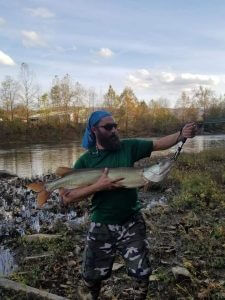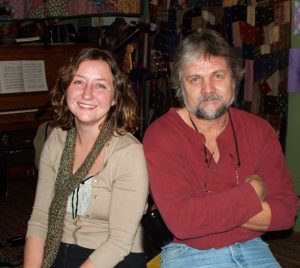Amanda Pitzer
Kingwood, West Virginia
Amanda Pitzer is executive director of Friends of the Cheat. She is a tenacious and dedicated educator and water advocate, having initiated many programs that earned her recognition in West Virginia. In her 10-year tenure at Friends of the Cheat, she has successfully constructed nine treatment projects to combat acid mine drainage, secured the preservation of 3,800 acres of the Cheat River Canyon, and established the Upper Cheat Water Trail with nine public access sites.
Amanda was recognized as a River Hero at River Rally 2020 in San Antonio, Texas.
This interview was conducted by Carly Schmidt on January 13, 2020. Learn more about Amanda and Keith Pitzer’s life and work, or to donate to the Keith Pitzer Memorial, please visit Friends of the Cheat.
Tell me about your role at Friends of the Cheat and what you’re focused on these days.
Friends of the Cheat is 25 years old this year. We were formed largely in response to pollution from abandoned and active coal mine sites, so we’ve been focused mainly on acid mine drainage for the past 25 years. In 1995, the Cheat River made American Rivers’s “Most Endangered Rivers” list, and in the last 20 years we’ve really seen it bounce back. We now have fish from headwaters to mouth, we’re seeing top predators come back, maintaining a healthy pH, and the Cheat is getting ready to come off the official 303(d) listing for mining-related impairments!
In the last two years, we’ve really been expanding our focus to include more water quality issues outside of acid mine drainage. When the river is dead, it’s hard to focus on sediment, impact from agriculture and failing sewer systems. Since we have done a good job at tackling our biggest and baddest actors, new problems are revealing themselves in the watershed. We’ve been monitoring fecal coliforms and working with our small towns here in Preston County to improve infrastructure. We’re also shifting our focus on some agricultural issues. We have our first five-year grant from the Natural Resources Conservation Service (NRCS) to do prioritization within the main Cheat River, work with landowners on things like cattle exclusion, and other related issues. It’s really exciting to engage in these other needs. We’re meeting a ton of new people and it feels good to not be stomping around in dead creeks all the time!
One big thing we’re looking to take on in the next decade is the removal of the only impediment to fish and boating passage in the Cheat River: the low-head dam at our defunct coal-fired power plant. This year we were just funded to start a reconnaissance study on dam removal! We’re working with a bunch of partners to create a case and raise the money to remove that dam. It’s so exciting to say that we have restored water quality on the Cheat and our next big goal is restoring natural flow. Our founders envisioned the River of Promise and restoring water quality, but I don’t know if they ever thought about the dam!
What an exciting new venture! Do you think the dam removal process will be more straightforward since the power plant is defunct?
I’ve never been involved in dam removal project. We border Pennsylvania and I grew up in Pennsylvania and they’ve really been kicking ass on dam removal as a state. They’re one of the most progressive states when it comes to dam removal, in part because they have a lot of them. Will this be harder or easier or fewer steps? I’ll speculate. This dam was build before the Federal Energy Regulatory Commission (FERC) existed, so it’s unique in that it is not a FERC-regulated structure. The plant closed in 2012 and it’s just been sitting there. It’s a relic. The community and partners are learning more about the contamination on the property. There’s coal ash on both sides of the river, so the property owner wants to get rid of it. One thing we have in our favor is that it is very unlikely that the plant will become some other type of power plant like a natural gas plant. At the same time, there really isn’t an impetus for the property owner to do anything, so inaction might be a challenge. We want a partnership, we don’t want to tell these people that they’re not in compliance. We want this process to be collaborative.
Is the community engaged in this dam removal project?

45″ muskie caught by Richard Rudisill below the dam.
Right now we are seeing a resurgence in walleye, which is our native game fish. Walleye and muskie were historically the species that populated the Cheat and we are seeing bigger and bigger fish. They’re spawning all the way into the Cheat Canyon. Just recently, we had a fisherman report a 45″ muskie that they caught a half mile from the dam! People are psyched about the fish! There’s been all this energy behind the restoration of the Cheat and good buzz about water quality and recreation. When we talk about these fish, it just opens the door to more engagement. I can talk about pH and water quality, but people don’t really care about that.
Preston County is a largely conservative county. Not a lot of people are voting for candidates who support water and recreation policies, but we’re seeing a slow change where politicians aren’t just showing up for photo ops, they’re having conversations around water quality and dam removal. We have all four county commissioners signed on to remove this dam and that’s a big step for our commissions to stick their neck our on an issue like this.
What brought you to your current role as executive director?
I think its so important to mention my experience as a teenager. The River Hero award has encouraged me to go back and connect with some of these people. My biology teacher engaged in a partnership with Allegheny College, which has a stream monitoring program. They would come into our classrooms after school as part of a voluntary program and teach us about water quality. Then, we would go into the field. This might sound cliche, but when I found my first water penny I was hooked! We were analyzing the bugs, which were teaching us about the water quality, and I just loved it. I ended up going to Allegheny and becoming a student teacher in that program for two years.
For many reasons (one being Organic Chemistry II) I changed my major from biology to studio art, which gave me these creative problem solving skills where I could take the logic and science and apply it to real life problems. When I graduated college, I wasn’t sure what to do with my art degree and biology minor, so I took a teaching position. They gave me all the art classes and geology. Being a private school, I made my own curriculum, so we could go outside and talk about art and design. It was a rural setting, so when we weren’t in class we were walking around in the woods.

Amanda and Keith
I taught there for a year and traveled back and forth to Preston County. I would visit my future ex-husband, who was the son of Keith Pitzer. Keith was the former director of Friends of the Cheat and was a River Hero in 2010. I fell in love with Keith and the river so I stayed! Keith helped me think about job prospects in this very small county. The local watershed group in Morgantown, WV had an open position for a part-time education coordinator. I worked with Friends of Deckers Creek for three and a half years and it was kind of a golden era for environmental education in West Virginia. And then life happened. Keith got diagnosed with cancer while I was on a trip with my students. It was about a year and a half later that Keith passed away, on December 22, 2009.
In no way did I think that I was cut out to fill his shoes. I was 29, a woman, had no management experience or graduate degree and I absolutely idolized Keith. Keith’s son pushed me to apply for the director position. I had been working for Friends of Deckers Creek for some time so I knew how a West Virginia watershed organization worked, so I just went in and sold myself. The two other final candidates, one was the first ever director and the other was their main partner at DEP, both older men, and they picked me! There were some grumblings and I think a lot of people thought I got it because I was Keith’s daughter-in-law, but they can all kiss my ass now because look how far we’ve come! And Keith set up all the dominoes. All the successes we’ve had in the last 10 years are because he laid the groundwork. I kind of came in when the organization was in a really bad place, in part because they failed to acknowledge the reality that Keith was really going to die, so they weren’t taking steps to record institutional knowledge. But I had so many good people surrounding me. That’s part of the magic of West Virginia that a lot of outsiders don’t understand, it’s the river that brings us all together. It’s what brought me here and it’s because of people like Keith.
Receiving the River Hero award 10 years after it was awarded to Keith must feel like you’ve come full circle.
I still have this imposter syndrome problem. It’s hard to take it all in, and the award has been a bit overwhelming. I’m bad at accepting complements and talking about myself. When Madison [Ball, Friends of the Cheat’s Restoration Program Manager] and Beth [Warnick, Friends of the Cheat’s Media and Outreach Specialist] were nominating me, they were trying to keep it all a secret. It was very validating and the award means a lot. It’s just so overwhelming to be given this award after Keith; he was such a quiet and competent visionary person. He would freak out if he saw the picture of the 45″ muskie! We still have many of the founders engaged as board members. We just celebrated the 25th Cheat River Festival and we had a reunion for everyone to get together and look back over the years. It was kind of creepy to see footage of the founders 22 years ago accurately predicting 20-year projects, but now it’s all happening! People set this intention, set the vision, and we’re carrying it out.







